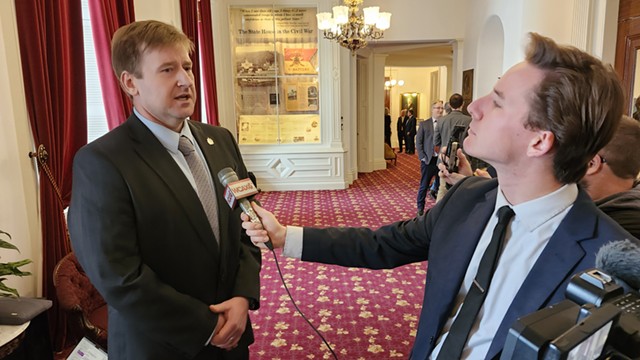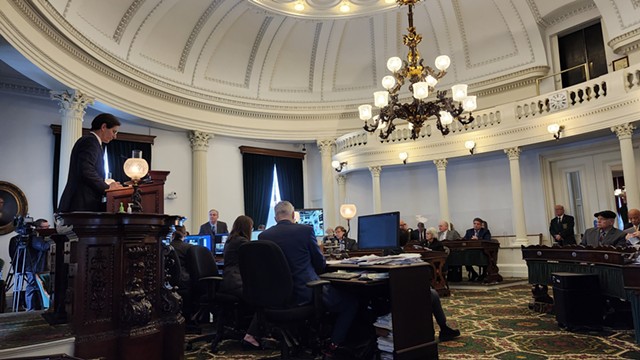
- Kevin McCallum
- Sen. Thomas Chittenden voted against overriding the veto.
The Vermont Senate on Tuesday failed to muster enough votes to override Gov. Phil Scott’s June veto of a bill to significantly expand the state’s bottle redemption system.
Unlike their colleagues in the House of Representatives, who earlier this month easily cleared the two-thirds majority needed to override Scott’s veto, the Senate failed to find the 20 votes necessary to follow suit.
The 17-13 vote means Scott’s veto stands and the state’s 5-cent per bottle redemption system will remain limited to beer, wine coolers and carbonated drinks.
The bill would have added a 5-cent deposit to a variety of other beverage containers beginning in 2027, including hard cider, coffee, sports drinks, juices and waters, and a 15-cent deposit for wine bottles.
The number and variety of bottled drinks has exploded in recent years, but the redemption system has not kept up, advocates argue.
 The bill would also have compelled drink manufacturers to establish an organization to manage the redemption program and would have exempted small retailers from having to accept bottle returns.
The bill would also have compelled drink manufacturers to establish an organization to manage the redemption program and would have exempted small retailers from having to accept bottle returns.
The goal of the bill, H.158, was to increase recycling rates, which are higher for beverage containers with deposits than for those recycled through the single-stream “blue bin” system. It would have the first major overhaul of the state’s bottle redemption system in 50 years.
Sen. Thomas Chittenden (D-Chittenden-Southeast) voted against overriding the veto. He argued that the state already has very high recycling rates and it would make more sense to improve the recycling system than the deposit system.
In an interview after the vote, Chittenden said he was worried that the changes would divert more recyclable material from the blue bin system and harm the bottom line of organizations such as the Chittenden Solid Waste District.
He also said he sees the deposit program as placing burdens on lower-income people and people who live in apartments and lack the space to store bags full of cans and bottles.
“I argue that it's a regressive tax on people’s time, storage and transportation costs,” Chittenden said.
The bill was a high priority for the Vermont Public Research Interest Group, the state’s largest environmental organization. Paul Burns, the group’s executive director, said it was unfortunate that some senators received poor information about the bill’s impacts.
The bill would have increased the number of redemption centers. “Those senators who voted against this are the ones who are making it more difficult for people to redeem their containers,” Burns said.
He said he planned to continue trying to educate lawmakers on the benefits of updating the redemption system and would push for the changes in future years.
Unlike their colleagues in the House of Representatives, who earlier this month easily cleared the two-thirds majority needed to override Scott’s veto, the Senate failed to find the 20 votes necessary to follow suit.
The 17-13 vote means Scott’s veto stands and the state’s 5-cent per bottle redemption system will remain limited to beer, wine coolers and carbonated drinks.
The bill would have added a 5-cent deposit to a variety of other beverage containers beginning in 2027, including hard cider, coffee, sports drinks, juices and waters, and a 15-cent deposit for wine bottles.
The number and variety of bottled drinks has exploded in recent years, but the redemption system has not kept up, advocates argue.

- Kevin McCallum
- The Senate failed to muster the 20 votes needed to override Gov. Phil Scott's June veto.
The goal of the bill, H.158, was to increase recycling rates, which are higher for beverage containers with deposits than for those recycled through the single-stream “blue bin” system. It would have the first major overhaul of the state’s bottle redemption system in 50 years.
Sen. Thomas Chittenden (D-Chittenden-Southeast) voted against overriding the veto. He argued that the state already has very high recycling rates and it would make more sense to improve the recycling system than the deposit system.
In an interview after the vote, Chittenden said he was worried that the changes would divert more recyclable material from the blue bin system and harm the bottom line of organizations such as the Chittenden Solid Waste District.
He also said he sees the deposit program as placing burdens on lower-income people and people who live in apartments and lack the space to store bags full of cans and bottles.
“I argue that it's a regressive tax on people’s time, storage and transportation costs,” Chittenden said.
The bill was a high priority for the Vermont Public Research Interest Group, the state’s largest environmental organization. Paul Burns, the group’s executive director, said it was unfortunate that some senators received poor information about the bill’s impacts.
The bill would have increased the number of redemption centers. “Those senators who voted against this are the ones who are making it more difficult for people to redeem their containers,” Burns said.
He said he planned to continue trying to educate lawmakers on the benefits of updating the redemption system and would push for the changes in future years.










Comments
Comments are closed.
From 2014-2020, Seven Days allowed readers to comment on all stories posted on our website. While we've appreciated the suggestions and insights, right now Seven Days is prioritizing our core mission — producing high-quality, responsible local journalism — over moderating online debates between readers.
To criticize, correct or praise our reporting, please send us a letter to the editor or send us a tip. We’ll check it out and report the results.
Online comments may return when we have better tech tools for managing them. Thanks for reading.